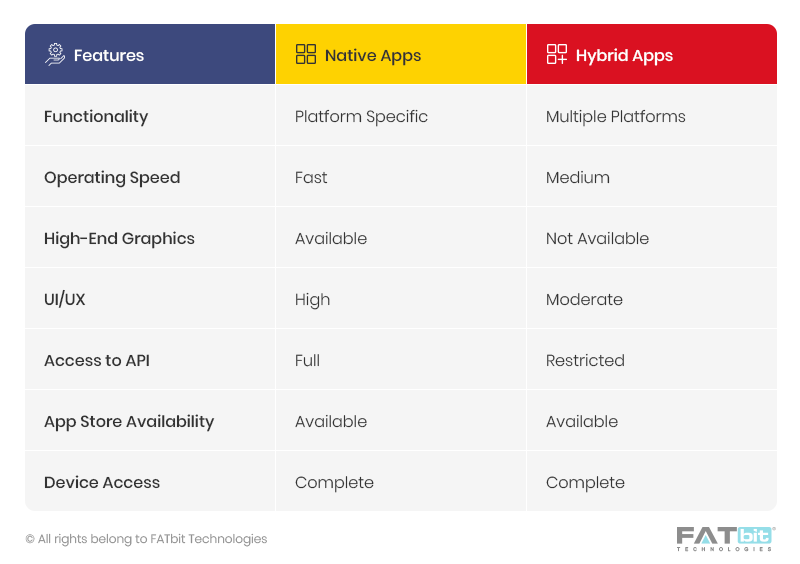Mobile app usage increases approximately 6% every year and almost 82% internet users in the United States use mobile devices to make purchases online. With mobile devices becoming the preferred way of exploring products and shopping online, e-commerce sellers are at their wits’ end to find the right marketplace app.
It is estimated that US mobile commerce sales will surpass $420 billion mark by 2021, making it even more crucial for businesses to have a mobile app. Choosing the right kind of app is not a walk in the park and requires thorough research.
You must have an understanding about the functionalities your users need and determine how they want to access the functionality.
Is getting a mobile app worth the effort?
Creating a mobile app for your online marketplace is one of the best decisions you will ever make. It is the first step in the right direction and increases your marketplace’s reach to a completely new demographic. However, once you have made the decision to get a mobile app, the next step is to choose what kind of app you should develop for your marketplace — Native or Hybrid.
Here is a brief introduction to Native & Hybrid Apps
- Native Apps are software programs developed to cater to a specific platform or device. These apps can provide optimized performance by leveraging latest technology and hardware features.
- Hybrid Apps are applications or web pages developed using HTML, CSS and JavaScript and wrapped in an application for native browsers like WebView for Android.
Before we discuss the two app kinds in detail, here is a quick overview about them:

Let’s Talk About Native Apps Now
Think about any app on your phone, there is a high chance that the ones you recall are native apps because native apps reside on mobile devices. Simply put, native apps are compatible with a particular operating system. An app developed for iOS platform won’t be compatible for an Android device.
For the marketplace owners with an inclination towards understanding technology, iOS apps are developed using Swift or Objective-C languages while Android apps use Java or Kotlin. Coding for iOS is done on Xcode, and Android apps are built on Android Studio.
Here are some pros of Native Apps
Developing a native app brings a wide range of benefits for the marketplace owner. In the following lines we will take a look at some of them:
- Performance: Thanks to the header files that are already present in the operating system, native apps are fast and reliable.
- Permissions & Functionalities: Native apps are installed directly on a mobile device, and thus have direct access to its camera, compass, microphone, swipe gestures and accelerometer, and more. Native apps offer better hardware-software interaction as compared to their counterparts.
- Notifications: Native apps offer an added benefit — Push Notifications. This means mobile user need not keep the app active all the time. Whenever user action is required, the native app sends a push notification. Thus saving resources.
- Compatibility: You won’t have to compromise on the UI/UX compatibility for different platforms while developing a native app. Since you are focusing on a single platform, you can make your apps’ UI/UX platform-oriented oriented.
Cons of Native Apps
A native app should be great and serve the user’s needs perfectly. But like all great things in life, they are not perfect. Let’s take a look at some cons of native apps:
- Multiple Codebases: Going for the native mobile app development means the online marketplace owner will need to create an app for every platform individually. Since each OS platform runs a different code, you’ll need multiple codebases — one for every platform you want to target.
- Multiple Developers: You have to create different native apps for different platforms, and to do that you will need more than one mobile app development team to complete the task. This means more investment in terms of time and money.
- Cost: There are no free lunches in life. And building native apps cost more than developing hybrid apps.
Let’s See How Hybrid Apps Work
As the name suggests, hybrid apps are a combination of native and web apps. A hybrid app can be installed like a native app but it’s actually a web app underneath. Hybrid apps run in a simplified browser like Webview and just like their web based counterparts, they are also built using HTML, JavaScript and CSS.
The basic purpose of a hybrid app is very different from a native app. Hybrid apps are an experimental step for ecommerce marketplace owners who are not sure whether their target audience will like their app or not.
E-commerce marketplace owners can get a hybrid app created without investing a lot of time and money. From there, business owners will get a rough idea about their app’s popularity and understand how the app interface is received by the masses. They can analyze the details of the experiment and then proceed to create a full-fledged native app.
Here are some pros of Hybrid Apps
Since hybrid apps are built for multiple platforms, the base code remains the same and you just need a little bit of tweaking to install them on all platforms. Let’s take a look at the key benefits of hybrid apps:
- Easy to Manage: Because of a single codebase, hybrid apps are easy to manage and install.
- Cost-Effective: You need to spend significantly less time and money to create a hybrid app and this makes them cost-effective as compared to native apps.
- Scalability: Unlike native apps, you can scale a hybrid app for any operating system.
- Accessibility: With streamlined programming and advanced technology features, hybrid apps can access phone features.
Cons of Hybrid Apps
While hybrid mobile apps solve a number of issues for new and existing online ecommerce marketplace owners, there are certain limitations. Let’s take a look at the cons:
- Performance Concerns: Unlike native apps, hybrid apps are not performance-oriented. One of the reasons behind it is the use of Webview for accessing an app. Although Webview delivers an experience close to the native apps, it cannot deliver the performance-enhancing features that native apps have.
- More Efforts: Making an app work seamlessly on different platforms is a difficult task. Since they are built using cross-platform solutions, hybrid apps require a lot of work.
- Higher Costs: Native app users are used to operating apps that are solely designed for an operating system making it difficult to please all camps (iOS, Android, Windows). Some app owners try too hard to add a customized feel to the hybrid apps thus adding to the development costs.
What App Should an Ecommerce Marketplace Owner Choose?
To each their own — the same can be said when choosing the type of app you want to create. Your priorities should be set and you must be clear as to what you are expecting from your mobile app.
Focus on your budget and choose one accordingly. Evaluate the level of surety you have about its popularity and mass acceptance. Hybrid mobile app development is a better option when you are unsure about the initial user response or don’t have a clear idea about how your final app should look like.
On the other hand, native apps offer a high level of functionality and deliver a seamless user experience. They also perform better than hybrid mobile apps.
Final Thoughts
Take the aforementioned pros and cons for both Native and Hybrid apps into consideration before making a final decision. Additionally, you can also do some research on your target demographic and develop an overall marketing strategy to find out how much investment are you willing to pour into custom mobile app development. Hopefully, you will be able to make an informed decision with all the information at your disposal and we wish you success for your e-commerce venture.
Connect with FATbit to Get a Smart Mobile App for your Business




Comments (2)
 Devcount
Devcount
 FATbit Chef
FATbit Chef
Hey,
Thanks for putting together this post on native and hybrid mobile apps. I particularly find your thoughts on multiple codebases very interesting.
I’m glad to find another amazing mobile app development blogger.
Cheers.
Hi Dev,
We are glad to hear that. Stay tuned for more such interesting blogs.
Best Regards,
Team FATbit